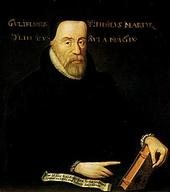You scored as Reformed Evangelical. You are a Reformed Evangelical. You take the Bible very seriously because it is God's Word. You most likely hold to TULIP and are sceptical about the possibilities of universal atonement or resistible grace. The most important thing the Church can do is make sure people hear how they can go to heaven when they die.
Reformed Evangelical
100%
Neo orthodox
79%
Evangelical Holiness/Wesleyan
79%
Fundamentalist
43%
Modern Liberal
43%
Charismatic/Pentecostal
39%
Emergent/Postmodern
36%
Roman Catholic
36%
Classical Liberal
21%
What's your theological worldview?
created with QuizFarm.comWilliam Tyndale was born around 1494, probably in North Nibley near Dursley, Gloucestershire. The Tyndales were also known under the name "Hitchins" or "Hutchins", and it was under this name that he was educated at Magdalen Hall, Oxford (now part of Hertford College), where he was admitted to the Degree of Bachelor of Arts in 1512 and Master of Arts in 1515. He was a gifted linguist (fluent in French, Greek, Hebrew, German, Italian, Latin, Spanish and of course his native English) and subsequently went to Cambridge (possibly studying under Erasmus, whose 1503 Enchiridion Militis Christiani - "Handbook of the Christian Knight" - he translated into English), where he met Thomas Bilney and John Frith.He became chaplain in the house of Sir John Walsh at Little Sodbury in about 1521. His opinions involved him in controversy with his fellow clergymen and around 1522 he was summoned before the Chancellor of the Diocese of Worcester on a charge of heresy. By now he had already determined to translate the Bible into English: he was convinced that the way to God was through His word and that scripture should be available even to 'a boy that driveth the plough'.From Foxe's Book of Martyr's " 'There dwelt not far off a certain doctor, that he been chancellor to a bishop, who had been of old, familiar acquaintance with Master Tyndale, and favored him well; unto whom Master Tyndale went and opened his mind upon divers questions of the Scripture: for to him he durst be bold to disclose his heart. Unto whom the doctor said, "Do you not know that the pope is very Antichrist, whom the Scripture speaketh of? But beware what you say; for if you shall be perceived to be of that opinion, it will cost you your life."Not long after, Master Tyndale happened to be in the company of a certain divine, recounted for a learned man, and, in communing and disputing with him, he drove him to that issue, that the said great doctor burst out into these blasphemous words, "We were better to be without God's laws than the pope's." Master Tyndale, hearing this, full of godly zeal, and not bearing that blasphemous saying, replied, "I defy the pope, and all his laws;" and added, "If God spared him life, ere many years he would cause a boy that driveth the plough to know more of the Scripture than he did.'"Reluctantly, he left for London to seek financial backing. Tyndale was firmly rebuffed in London when he sought the support of Bishop Cuthbert Tunstall. The bishop, like many highly-placed churchmen, was uncomfortable with the idea of the Bible in the vernacular. Tyndale, with the help of a merchant, Humphrey Monmouth, left England under a pseudonym and landed at Hamburg in 1524. He had already begun work on the translation of the New Testament. He visited Luther at Wittenberg and in the following year completed his translation.Following the publication of the New Testament, Cardinal Wolsey condemned Tyndale as a heretic and demanded his arrest.Tyndale went into hiding, possibly for a time in Hamburg, and carried on working. He revised his New Testament and began translating the Old Testament and writing various treatises. In 1530 he wrote The Practyse of Prelates, which seemed to move him briefly to the Catholic side through its opposition to Henry VIII's divorce. This resulted in the king's wrath being directed at him: he asked the emperor Charles V to have Tyndale seized and returned to England.Eventually, he was betrayed to the authorities. He was arrested in Antwerp in 1535 and held in the castle of Vilvoorde near Brussels.From Foxe's Book of Martyr's : Master Tyndale, remaining in prison, was proffered an advocate and a procurator; the which he refused, saying that he would make answer for himself. He had so preached to them who had him in charge, and such as was there conversant with him in the Castle that they reported of him, that if he were not a good Christian man, they knew not whom they might take to be one.He was tried on a charge of heresy in 1536 and condemned to the stake, despite Thomas Cromwell's attempted intercession on his behalf. He was mercifully strangled, and his dead body was burnt, on 6 October 1536. His final words reportedly were: "Oh Lord, open the King of England's eyes."
